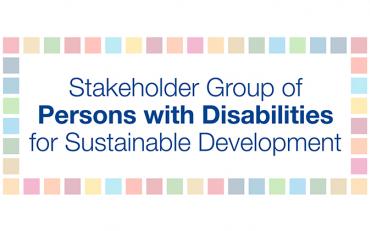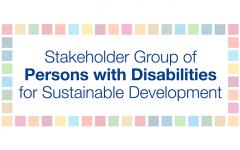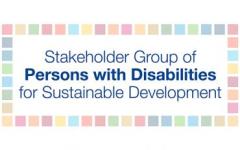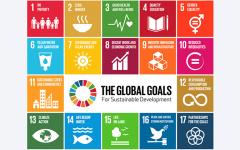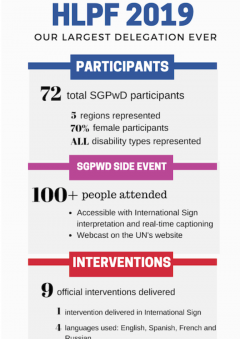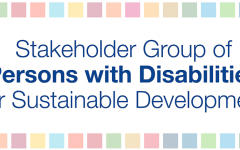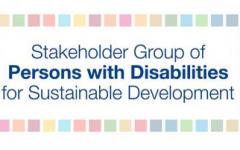November 2017
<< Back to HLPF 2018 main page
1. Global processes
Annually persons with disabilities are asked to make an official submission to the United Nations addressing the annual theme of the HLPF. For 2018, we expect that the submission will be six pages and due some time in April. Please note that the UN defines the length and date of the submission. The submission will be published on the UN website and also widely disseminated to Member States and UN Agencies.
INPUT! In line with the 2018 HLPF theme, we are asking for inputs over sustainable and resilient societies and the inclusion and leadership of persons with disabilities; we are calling for any research, papers, and/or information addressing this theme. We will compile all material received and subsequently share an outline for further discussion. You will be able to contribute and share on a continual basis via these bulletins. Please send your inputs with the subject line: Submission 2018 HLPF to Orsolya Bartha (obartha [at] ida-secretariat.org) and Elizabeth Lockwood (elizabeth.lockwood [at] cbm.org).
Financing for Development
Inter-Agency Task Force (IATF) on Financing for Development
The 2018 Financing for Development (FfD) process for the implementation of the Sustainable Development Goals (SDGs) has begun. On 27 October, the Inter-Agency Task Force (IATF) on Financing for Development held a meeting at the UN in New York to discuss its report for 2018. The IATF report will contribute to the financing for development process. As the only civil society presenter, IDA and the International Disability and Development Consortium (IDDC) advocated for the inclusion and participation of civil society and in particular of persons with disabilities in the upcoming report. Click here to read the presentation. More information available here.
SIGN UP to receive information through the Civil Society FfD Group
The CSO Financing for Development (FfD) Group is an open group with the single criterion for membership being representation of a public-benefit civil society organization. The Group has a fundamentally thematic focus, bringing together civil society organizations, networks and federations that are interested and active in the Financing for Development Process and its interrelated domains. In various conformations, the CSO FfD Group’s engagement dates back to the Preparatory Committee process leading up to the first International Conference on Financing for Development in Monterrey (March 2002), and then continues through the preparation and follow-up of the Financing for Development Conference in Doha (November 2008) and the Third Financing for Development Conference in Addis Ababa (July 2015). In particular, the Group has been active in its present format (Global Social Economy Group – GSEG) since the Doha FfD Review Conference in 2008. IDA and IDDC are active members of the CSO FfD Group.
Please be aware that this listserv below provides information on UN-related processes on FfD and does not provide information on receiving funds. For those who are interested in getting information on the Financing for Development (FfD) process, please join the Global Social Economy Group/CSO FfD Group Email List by completing the form available here.
Informal Feedback Meeting on the 2017 High-level Political Forum on Sustainable Development in Geneva
On 24 October in Geneva an Informal Feedback Meeting on the 2017 HLPF on Sustainable Development was held and organized by the SDG Lab for Member States and other interested stakeholders. The SDG Lab is a multi-stakeholder initiative that is leveraging the Geneva Ecosystem and beyond to support policy, practice and action towards implementation of the SDGs. The objectives of the informal feedback meeting were to:
- Offer Member States an informal feedback on the main themes that emerged in New York and link activities of shared value between New York and Geneva;
- Facilitate open and frank dialogue between Member States and other Stakeholders on information and opportunities arising from the VNRs and how the Geneva ecosystem can contribute; and
- Create the space to build partnerships to address concrete implementation challenges of the 2030 Agenda.
IDA on behalf of the Stakeholder Group of Persons with Disabilities presented at this event on welcoming the accessibility arrangements undertaken by the UN, and expressing concern about the efficiency of the Voluntary National Reviews. Click here to read the presentation.
Multi-stakeholder meeting about the voluntary national review in Uganda
The German initiative, Partners for Review (P4R) Network, meeting took place in Kampala, Uganda from 24-25 October with 102 participants from the government, civil society, the private sector and academia discussing the national review process of SDG implementation. The objective of the meeting was to address cross-cutting challenges of national implementation and the imperative of strengthening stakeholders’ participation and engagement. Mr. Anderson Gitonga Kiraithe, representative of IDA, Member of the African Disability Forum and Executive Director of the United Disabled Persons of Kenya, Nairobi attended the event. Anderson Gitonga Kiraithe presented on the inclusion of persons with disabilities in the implementation of the SDGs and highlighted the importance of using the CRPD as a guideline when implementing the SDGs and to continuously involve organizations of persons with disabilities worldwide. He also drew attention to the importance of disaggregation of data by disability by using the Short Set of Questions developed by the Washington Group. Additional information can be found here.
Accessibility
Accessibility greatly improved for persons with disabilities at the 2017 HLPF as a result of close collaboration between the Stakeholder Group of Persons with Disabilities and the UN system. While gaps remain, it is necessary to recognize how far we have come and to thank the UN, in particular the UN employees, who went beyond their mandate and supported the participation of persons with disabilities at the 2017 HLPF in New York and remotely. Continue reading for a few positive achievements of accessibility at the 2017 HLPF:
- Communication Access Realtime Translation (CART) services for deaf and hard of hearing participants for all sessions and via webcast
- International Sign interpretation for the Ministerial Segment and via webcast
- Distribution of portable audio translation devices for wheelchair users and sign language interpreters in the gallery for all sessions
- Provision of a reserve wheelchair within the UN
- Specific seats reserved for persons with disabilities with ample space to maneuver
- Accessible features on the HLPF website
On behalf of the Stakeholder Group of Persons with Disabilities, we have acknowledged the work of the UN by thanking them through official letters.
- Accessibility thank you letter (ECOSOC) available here.
- Accessibility thank you letter (Imre) available here.
- Accessibility thank you letter (Zhu) available here.
The sixth IAEG-SDGs indicator meeting in Bahrain
The sixth meeting of the Inter-agency and Expert Group on Sustainable Development Goal Indicators (IAEG-SDGs) was held from 11 to 14 November in Manama, Kingdom of Bahrain.
Prior to the IAEG-SDGs meeting, disability advocates advocated to the co-chairs of the disaggregation work stream requesting that the IAEG-SDGs adopts clear recommendations to use the Short Set of Questions developed by the Washington Group as a methodology to disaggregate SDGs indicators by disability. In addition, disability advocates attended the IAEG-SDGs meeting in Bahrain and coordinated with other civil society participants in drafting joint statements. Additionally, disability advocates have participated in different events with the objective to ensure broad support for the Short Set of Questions developed by the Washington Group. An advocacy brief (short and long version) containing facts and rationale has been prepared and is available below:
- Short version of the advocacy brief available here.
- Long version of the advocacy brief available here.
- More information on the meeting is available here.
Toolkit and Film
Thank you for engaging in the VNR toolkit for DPOs. We will send a finalized version soon. In addition, the IDA film is also being finalized
2. Regional section
Regional engagement
Every bulletin will focus on regional engagement of DPOs. It is a space to exchange on our advocacy in the five regions (Asia Pacific, Europe, Latin America, the Arab region and Africa) and to make the link between the national and global levels. It is also an opportunity to update each other on the regional work done around the yearly forums hosted in each region to prepare Member States to the High-level Political Forum.
Please share information on what is taking place for persons with disabilities and the SDGs in your region. Dr Marion Steff from the European Disability Forum will manage the content; please send information to marion.steff [at] edf-feph.org. We will share the information in the next bulletins. Content needs to be sent each month before the 5th of that month.
For more information on what is taking place at the Regional UN Headquarters, click on the following links:
- ECLAC: https://www.cepal.org/?idioma=IN
- ESCAP: http://www.unescap.org
- ECE: http://www.unece.org/info/ece-homepage.html
- ESCWA: https://www.unescwa.org
- ECA: https://www.uneca.org
ASIA
ESCAP engagement on the 2030 Agenda and sustainable development processes – upcoming opportunities
Civil society experts are invited to engage with United Nations ESCAP in different activities related to implementation of the 2030 Agenda in the coming months. This includes:
- Subregional Forums on the SDGs (September-November 2017)
- SDG Week in Bangkok (27 November to 1 December 2017)
- Guidelines on Multi-Stakeholder Partnerships (MSPs) (October and November 2017) or complete the offline version of the questionnaire and send to escap sdghelpdesk [at] un.org with the subject line “MSP Guidelines Asia Pacific”
- Contributions to the review of the cluster of goals for the 2030 Agenda (October-December 2017)
- Collecting good practices on stakeholder engagement for the 2030 Agenda (November-January 2017)
More information available here.
EUROPE
New EU-SDGs indicators report
EUROSTAT, the European agency working on statistics, is expected to publish its first monitoring report “Sustainable Development in the European Union - Monitoring report on progress towards the SDGs in an EU context” on 15 November. As a reminder, the European Union (EU) came up with its own set of EU-SDGs indicators comprised of 17 goals and 100 indicators (included 15 indicators on disability). More information to come when the report will be out.
Save the date – next SDG Watch Europe plenary on 23 November!
SDG Watch Europe, the Civil Society platform monitoring the SDGs at the European level, is organizing its next plenary meeting on 23 November 2017. The meeting will be located at Rue de la Linière 11, room Beijing (5th floor) from 9:30 AM until 13:00 PM. The European Disability Forum has been invited to chair the meeting. Please click here to register for the meeting.
PACIFIC
Registration open for International Civil Society Week (ICSW), Fiji, 4-8 December 2017
From 4-8 December 2017, over 400 civil society leaders from around the world will gather in Suva, Fiji for the 14th event International Civil Society Week (ICSW), being organised jointly by CIVICUS and the Pacific Island Association of NGOs (PIANGO). ICSW is a key global gathering for civil society and other stakeholders to engage constructively in finding common solutions to global challenges. This is the first time CIVICUS and partners will hold the global gathering in the Pacific region. This year’s ICSW will address civil society issues related to the theme “Our planet. Our struggles. Our future.” and will feature more than 25 events organised by leading civil society organisations from around the world.
- Our planet and its biodiversity are under threat, and it is often excluded people that face the most severe and unjust consequences. In the “Our Planet” programme track, delegates will discuss why innovation and good practice are vital to realising environmental sustainability, the Paris Climate Agreement and Agenda 2030.
- A global crisis of democracy and a clampdown on people’s rights are affecting the progress of our social justice struggles. In many of our societies there is rising extremism and intolerance. Even in countries with long-established practices of democracy, the right to participate and express dissent is under attack. This is what the “Our Struggles” programme track will focus on at #ICSW2017.
- Civil society is organising and responding to the crises facing us in powerful new ways to create the future we want. In the “Our Future” track, events will explore how we support the next generation of leaders and build solidarity across diverse movements, mobilisations and initiatives.
Key speakers include José Ramos-Horta, Former President of East Timor; Helen Clark, Former Prime Minister of New Zealand; Dave Archambault of Standing Rock and May Boeve of 350.org, along with other civil society and climate change leaders from across the world.
- Read more about the programme here.
- To register for #ICSW2017, please fill out the online registration form.
- For more information, please contact the ICSW 2017 Secretariat icsw [at] civicus.org
AFRICA
October 18, 2017 High-Level Event 2017 Africa Sustainable Development Report Launch at the African Union Permanent Mission to the UN New York
The 2017 Africa Sustainable Development Report Launch celebrated the African Union’s unique approach to sustainable development by interconnecting and hinging and collapsing the 2063 agenda with the 2030 Agenda while making sure that the aspirations of each target are met. The report provides a benchmark on the progress made towards sustainable development and the next steps towards the fulfilment of both agendas. Both Agendas provide a framework to galvanize global and regional support for the realization of national priorities, drawing on the collective action of all stakeholders. Key issues mentioned included data and analytics, financing, poverty, agriculture and energy. In each issue, the importance of collaboration and cohesion were emphasized. The presentation highlighted the idea that in order to improve, Africa needs to be able to measure. Thus, the effective implementation of both agendas will require strengthening capacities for data gathering, analysis and reporting. It was noted that in the presentation that Africa will need a total of 264 billion dollars for both agendas to be achieved. However, Africa would be able to fund its own agenda if the right instruments are used; namely proper fiscal policies and making responsible decisions to keep money within Africa rather than outside the continent. This also includes domestic resource mobilization, and closing leakages. Africa Currently has a growth rate of 3.2% but will need a rate of 7% to achieve these goals. Additionally, Africa needs to develop a new institutional arrangement with better governance and better system policies. More oversight is needed in countries to assist in implementation, as well as coordinating national and organizational interests and programs.
3. National processes
Vietnam training
A workshop will be held in Hanoi, Vietnam from December 10th-15th, 2017 and will include representatives from a diversity of DPOs in Vietnam and from neighboring countries in the region. The workshop aims to support organizations of persons with disabilities (DPOs) to better exercise the interrelationship between SDGs and the CRPD and to report to UN monitoring mechanisms and engage with them. The curriculum is also built to support DPOs to make the most of the SDG momentum, to further implement the CRPD and use the CRPD to frame implementation of the SDGs; with the aim to equip DPOs to prepare a comprehensive report on the SDGs national implementation and monitoring, in line with the CRPD.
For more information please contact Megan Smith msmith [at] ida-secretariat.org and Tchaurea Fleury tfleury [at] ida-secretariat.org.
Contact Information: If you have information to share or would like to get in touch with us, please email Dr. Orsolya Bartha obartha [at] ida-secretariat.org, Dr. Elizabeth Lockwood elizabeth.lockwood [at] cbm.org and Megan Smith msmith [at] ida-secretariat.org.
